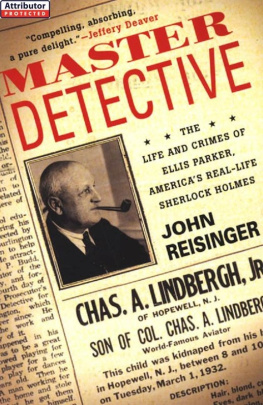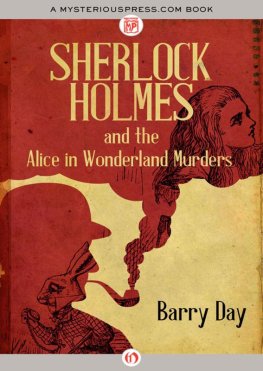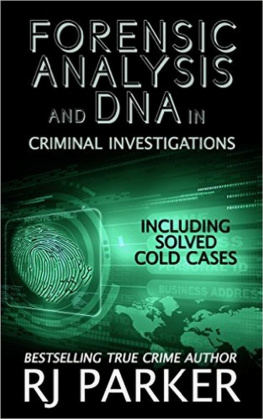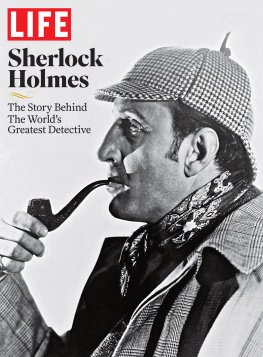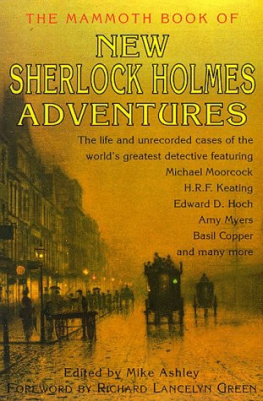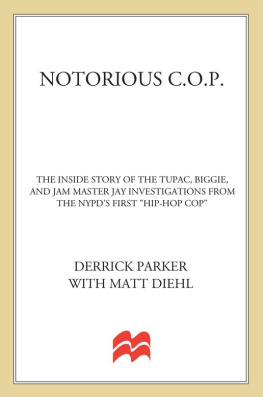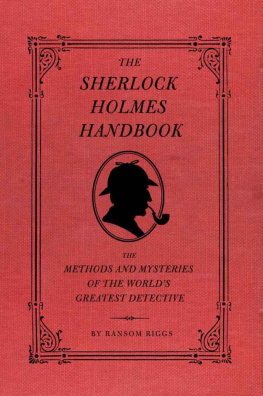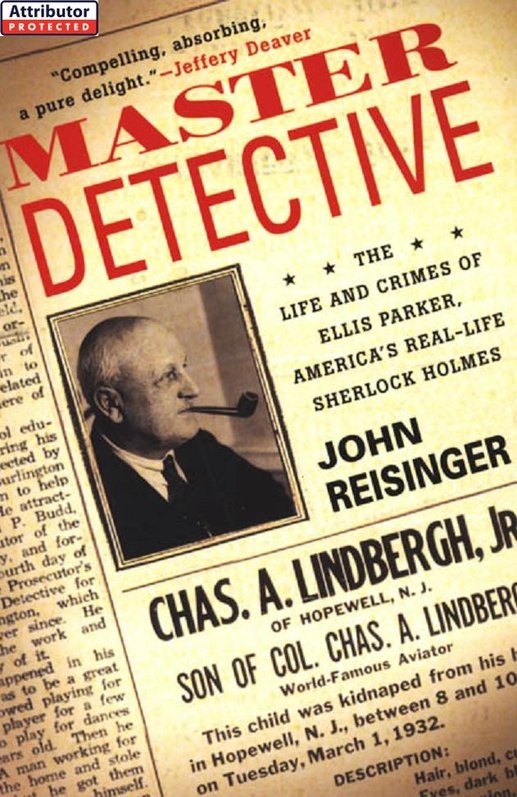Acknowledgments
D ISCOVERING THE STORY of Ellis Parker was a detective feat in its own right. I wish to thank the following people for their generous assistance that made it possible:
Herman Bading, Anna Badings son
Mr. and Mrs. Conly D. Brooks, Jr., who generously opened their Mt. Holly home, and loaned me a file of newspapers left behind by Ellis Parker
Elton A. Conda, county surrogate, Burlington County, New Jersey, who remembered the Parker case and found Ellis Parkers will
Robert Congleton, archivist of Rider University Library, who provided information on the Cranberry King murder
Walter Corter, chief detective, Burlington County, New Jersey, who discussed his predecessor and gave some new leads
James Dedman, Lindbergh case expert and researcher, University of South Carolina
Ronelle Delmont, whose website, www.lindberghkidnappinghoax.com has an extensive collection of case resources
Mark Falzini, New Jersey State Police museum archivist, who guided me through the Parker-Wendel-Hoffman files in the museum
Robert Fisher, who gave me a tour of the Mt. Holly Elks Club
William Fullerton, Ellis Parkers grandson, who maintains an Ellis Parker website ( www.fulerton1.com ) and generously provided information about his grandfather as well as family photos
Cindy Grassia, Camden Courier-Journal, who dug out the Courier Journal s extensive articles on the Parker-Wendell case
Fred Kafes, grandson of John H. Kafes, Paul Wendels attorney
Kelvin Keraga, Lindbergh case researcher and author of the definitive study of the wood evidence
Dave Kimball and Bill Reilly, Burlington County Prison Museum, who researched and provided records on Ellis Parker
Allen Koenigsburg, Lindbergh case expert, researcher, and website manager ( members.aol.com/LindyTruth/ ), who compared notes and provided information
Harry McConnell, chief detective of Burlington County after Ellis Parker, who shared his files and personal reminiscences of Parkers secretary, Anna Bading
Michael Melsky, Lindbergh case expert, researcher, and website manager ( hometown.aol.com/mmel71/page5.html ), who compared notes and provided information
Hope Nelson, Governor Hoffmans daughter, who shared memories of her father and Ellis Parker
Randall Parker, Ellis Parkers grandson, who provided some more pieces of the puzzle
Bill Reidy, Highfields director, who gave a personal tour of the Lindbergh house and grounds
Steve Romeo, Lindbergh case expert and researcher, who compared notes and provided information
Andrew Sahol, Ellis Parkers grandson, who generously shared his files, photographs, and memories
Leon Sheer, M.D., who provided medical information on various medical questions including Parkers possible brain tumor, the condition of the corpse of the Lindbergh baby, and on the Situs Inversis condition described in the Washington Hunter murder
And Dorothy Christopher, Jim Gentry, Shelly Greenberg, H.P. Ketterman, James Logan Jr., Paula Manzella, Stanley Schapiro, David Thaler, Phyliss at Bright Horizons Realty, and many others who gave information and encouragement
Epilogue
Like actors departing after the last act of a long-running play, the principals involved in the second Lindbergh kidnapping dispersed and went in very different directions.
The Lindberghs never returned to the unfinished Hopewell home and moved to England in an attempt to recede from the public eye. Anne Morrow Lindbergh became a respected author. Charles Lindbergh continued his work in aviation, and became a spokesman for the isolationists who opposed Americas entry into World War II.
Anna Hauptmann spent the rest of her life believing in her husbands innocence and working for his exoneration, even suing the State of New Jersey for wrongful death in 1985. She died in 1994.
Warden Mark Kimberling was appointed head of the New Jersey State Police in 1936.
Judge William Clark was promoted to the Circuit Court of Appeals in 1938 and served in the army in World War II. After the war he became chief justice of the Allied Appeals Court at Nuremberg where he considered officials who had abused their offices in a far more terrible way than Ellis Parker ever had.
Murray Bleefeld, Harry Weiss, and Martin Schlossman each received a sentence of twenty years to life at New Yorks Sing Sing prison in Ossining, New York. All were paroled a few years later, but soon returned to their old ways. In 1946, Murray Bleefeld and Martin Schlossman were indicted by a federal grand jury for filing almost $55,000 in false payroll claims in a Brooklyn shipyard. Murray Bleefeld contacted writer Phillip Scaduto in 1973, promising the real story of the Lindbergh kidnapping. Bleefeld told Scaduto Wendel had confessed freely. Ellis Parker, he insisted, had been right all along. Bleefeld explained his earlier, opposite testimony by claiming he had testified as he had on the promise of no jail time. The result was Scapegoat , published in 1976.
Colonel H. Norman Schwarzkopf was replaced as head of the New Jersey State Police by Warden Mark Kimberling. For a time, he narrated the popular radio crime show Gang Busters. He returned to the military in 1940, was promoted to brigadier general, and later helped to organize and train the Iranian police force. Returning to New Jersey, he became head of the states Department of Law and Safety. His son is Gulf War commander Stormin Norman Schwarzkopf. Col. Schwarzkopf died in 1958.
Harold Hoffman never held elective office again, though he was appointed head of the New Jersey Employment Compensation Commission in 1937. According to his daughter Hope, he seldom spoke of Ellis Parker because he found the subject too painful. In 1954, Governor Meyner received an independent report of mismanagement and possibly theft of state funds in Hoffmans agency. Hoffman was suspended and the new head of the New Jersey Department of Law and Safety, H. Norman Schwarzkopf, was asked to investigate. A short time later, Hoffman gave his daughter Ada a letter to be opened only after his death. Two months after that, he was found dead in his hotel room, apparently of a heart attack. The letter to his daughter confessed to a long career of embezzlement. Starting with his efforts to repay a campaign debt in the 1920s, Harold Hoffman had frantically borrowed, transferred, and outright embezzled funds through the various offices he held. In total, Harold Hoffman embezzled more than three hundred thousand dollars.
David Wilentz reentered private law practice. His firm had many well-connected clients, including several casinos in Atlantic City. Wilentz remained active in New Jersey politics until his death in 1988. His son became a justice of the New Jersey Supreme Court. His law firm, Wilentz, Goldman, and Spitzer survives. Headquartered in Woodbridge, New Jersey, the firm has over one hundred fifty attorneys.
Cora Parker lived in the Garden Street house for another ten years, then went to live with her daughter until joining Ellis in 1967. She was dependent on her children for support after Burlington County decided she was not eligible to receive any of Elliss pension. On Christmas each year, she received an unsigned card postmarked Brooklyn, N.Y., wishing her the best of the season. From the postmark and the handwriting, she was convinced the cards came from Paul Wendel. The cards continued until the 1950s.

